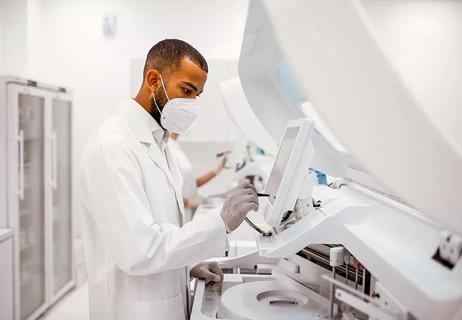Thoughts and feelings can change over time; relaxation, self-care and support groups can help

There’s no doubt that living with cholangiocarcinoma (bile duct cancer) can be physically and mentally taxing. You’re managing multiple appointments. Dealing with the toll of your condition and your treatment. And worrying about what the future may hold.
Advertisement
Cleveland Clinic is a non-profit academic medical center. Advertising on our site helps support our mission. We do not endorse non-Cleveland Clinic products or services. Policy
As you seek treatment for your condition, your mental health can often be left on the back burner. According to the Cholangiocarcinoma Foundation, 72% of people with bile duct cancer say they’ve experienced symptoms of depression that made their daily lives somewhat difficult. About half of people with bile duct cancer report symptoms of severe depression. Anxiety is also a common experience.
“When you’re dealing with cancer, it’s normal and natural to feel sadness, fear or worry,” says clinical psychologist Melissa Walt, PsyD, who specializes in cancer support. “I can’t emphasize enough how natural that response is. But what we also see is that, especially in the early phases, some people get so caught up in taking care of their physical health during cancer — and rightly so — that they neglect their mental health, whether intentionally or unintentionally.”
We talked with Dr. Walt about the mental health aspects of living with bile duct cancer and strategies to care for your emotional health during your treatment and beyond.
The impact of bile duct cancer on your mental health will depend on a lot of factors and is likely to ebb and flow throughout your journey.
“The emotional impact of bile duct cancer exists on a continuum,” Dr. Walt says. “Everybody feels and responds differently. That can be based on your prognosis, your previous life experiences, the coping strategies you’ve used in the past, the support you have in place, your financial situation — all of these different factors make a difference in how you feel and how you respond emotionally.”
Advertisement
Dr. Walt shares here a glimpse into the mental health experience that some (certainly not all) people may face while living with bile duct cancer.
It’s important to remember, though: There’s no “right” or “wrong” way to feel when you’re living with bile duct cancer. No two people will have the same experience or feel the same way. What you feel is valid and important.
When you’re first diagnosed with bile duct cancer, your world can quickly fill up with appointments, tests and treatments. In these early days, your feelings may be pushed aside as you instead focus on your physical health.
“Especially in the early phases, when you are first diagnosed, the instinct can be, ‘Ready-Set-Go’ with taking care of yourself physically — the tests and the meetings with your oncologist and your surgeons,” Dr. Walt says. “It’s often not until later that patients start checking in with their thoughts and feelings associated with everything they’ve been through since diagnosis.”
Dr. Walt’s advice
It’s never too early to ask your healthcare team about the mental health services available to you. You may be able to schedule appointments for therapy or join a support group at times and places that coincide with other appointments. “I always recommend people living with bile duct cancer start that conversation early, even if you don’t know how you feel or what you need at the onset,” Dr. Walt says.
Once the whirlwind of diagnosis wears off and you become more entrenched in the day-to-day life of living with bile duct cancer, the numbing effect of those early days can wear off. This can unearth a lot of feelings.
“I often see that it’s after a surgery or after people have established routines with radiation or chemotherapy that they pause to reflect on how cancer is affecting them, emotionally, socially and spiritually,” Dr. Walt says. “This is the time when I often hear from people about the impact cancer is taking on their mental health and they feel ready to start to unpack and process their emotions.”
Common questions and worries during bile duct treatment include:
Dr. Walt notes that it’s healthy and natural to feel sad, scared and worried when you’re living with cancer. But if those feelings aren’t appropriately addressed, they can become uncontrollable or even lead to greater problems.
“For example, what may start as mild distress can turn into a clinical depression,” Dr. Walt adds.
People living with bile duct cancer are often faced with a rigorous treatment regimen. People who are clinically depressed may be less able to participate in their treatment. They’re more likely to miss appointments or not adhere to their medication plan.
Advertisement
Dr. Walt’s advice
If you’re experiencing prolonged feelings of profound sadness or anxiety, talk with your healthcare provider. Therapy and medication may be available to you.
If your treatment is such that you aren’t able to work or take part in the activities you normally would, focusing on small, manageable goals can give you a feeling of accomplishment. Maybe it’s putting on makeup. Maybe it’s getting the mail. Or finishing a puzzle. “Having at least one thing to look forward to each day can help you feel a sense of purpose and bring you happiness in your day-to-day,” Dr. Walt advises.
What we all look forward to after a cancer diagnosis is the chance to return to life the way you once knew it. Put the surgeries and the nausea and the fatigue in your rearview mirror and never look back.
Dr. Walt says that even after active treatment for bile duct cancer, some people are surprised to realize how profoundly cancer has affected them mentally.
“For a lot of people, thinking about cancer doesn’t ever go away,” Dr. Walt notes. “The hard answer is that cancer will always be a part of your life experience. It can take some time to understand how to coexist with this chapter of your life, but it’s really an important skill to learn.”
Advertisement
Dr. Walt’s advice
Aim to identify positive ways your life may have changed. “You may find that cancer has given you a unique perspective that you didn’t see before,” she says.
You may find you have more empathy for people who are in pain or who are struggling. You may find you’ve developed a closer bond with your family or your friends. You may have learned to not sweat the small stuff quite so much.
Just as there’s no one way to feel about your experience with bile duct cancer, there’s no one right way to manage those emotions.
“There’s no manual that says how best to live through cancer and cope with all of the emotions and challenges attached to it,” Dr. Walt explains. “A lot of times, people living with bile duct cancer try to use coping skills that they have used to manage previous stress in their lives and find that those strategies don’t actually translate with cancer.”
Here, Dr. Walt shares some strategies that may help:
Meditation and focused breathing exercises can calm your nerves and slow down your brain. Taking some time to nurture yourself and be present in the moment can put a stop to runaway thoughts that leave you anxious or sad.
Your smart device’s library is full of helpful mental health apps to get you started.
Advertisement
Complementary medicine techniques are often used alongside traditional treatments and can help reduce anxiety and stress and improve fatigue along with other helpful benefits.
These approaches include:
Talk with your healthcare provider about how these treatments and others could work as part of your treatment plan.
Taking time to do something that makes you feel good is an important part of overcoming the stress and worry of living with bile duct cancer. You’re more than a cancer patient: you’re a complete person with interests and relationships that can fill up your emotional tank, so to speak. Making time for self-care means purposefully doing things that bring you joy, like:
OK, you have a team of doctors caring for you already, we get it. Aside from cancer treatments, though, steps you can take to care for your physical well-being can help lift your spirits, too.
Dr. Walt suggests focusing on sleep, avoiding alcohol and other substances, eating healthy and exercising to the extent you can. Of course, your cancer treatments and side effects may make it harder than it was before. But being thoughtful and taking the small steps you can will feed your emotional well-being.
It can be easy to feel isolated when you’re living with bile duct cancer, but the truth is, you’re not alone.
“There is support out there. You don’t have to go through this by yourself,” Dr. Walt says.
Professional services, like therapists and other mental health professionals, are available and can help you navigate your emotional journey with cancer. Also, your cancer team may be able to suggest support groups at your cancer center, through nonprofit organizations, religious groups and other organizations where you can find community. Some groups meet online, and there are social media groups, too, where you can engage with others who share your experience.
The uncertainties of a bile duct cancer diagnosis and the rigors of treatment can take a toll on anyone’s mental health. In the midst of caring for your body and all that entails, remember that your thoughts and feelings are important to your overall well-being.
“Your mind and body are interconnected. They’re pieces of the same machine,” Dr. Walt says. “If one goes off track, it affects the other. Caring for your mental health during bile duct cancer treatment will help you keep your machine running the best it can.”

Sign up for our Health Essentials emails for expert guidance on nutrition, fitness, sleep, skin care and more.
Learn more about our editorial process.
Advertisement

You may experience fatigue, weight loss, nausea and diarrhea, but exercise and medication can help

There are many options, including surgery or medication

Biomarker testing tells doctors how to target their treatments

Rely on trusted information from hospital systems, medical nonprofits or your oncologist

A decreased appetite can cause weight loss, so opt for smaller meals and full-fat foods

Even small moments of time outdoors can help reduce stress, boost mood and restore a sense of calm

Exploring your hidden side can lead to better understanding of what makes you tick

Burnout is often driven by long periods of stress without time to recover — but practicing self-care and creating work/life boundaries can help

Even small moments of time outdoors can help reduce stress, boost mood and restore a sense of calm

A correct prescription helps your eyes see clearly — but as natural changes occur, you may need stronger or different eyeglasses

Both are medical emergencies, but they are very distinct events with different causes